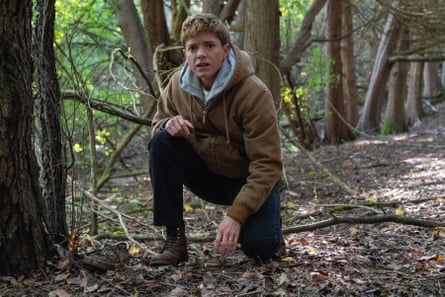Oh happy day, when we were divided from America, as that insightful old veggie burger George Bernard Shaw had it, only by a common language. These days, there’s rather a lot more to contend with. One that may still be swimming under your radar – or perhaps just obscured by the massive orange flares going off every 30 seconds – is the multibillion dollar “troubled teen industry”. From sea to shining sea, the US is filled with privately run “therapeutic” institutions that promise to rehabilitate “difficult” teenagers and turn them into civilised members of society. They are often transported there by “teen escort services”, who come for the unsuspecting adolescents in the middle of the night and remove them against their – though not their parents’ – will from the family home. “But that’s tantamount to kidnap!” you may think, in your silly British way. And that is why they fought to become independent of us and our lily-livers all those years ago.
That is the background against which Mae Martin, standup comedian and writer of the immaculate comedy, Feel Good, has created the eight part mystery drama Wayward. (Martin is non-binary and uses they/them pronouns. Their character in Wayward, a cop called Alex Dempsey, is a trans man. Martin’s mesmeric presence, comic timing and occasional air of possession by a baffled duckling endure).

Wayward is set in 2003 – partly, I suspect, to avoid the many problems the setup would face if these teens had access to smartphones, and partly to add to the excellently eerie vibe. There is nothing stranger than the recent past. Alex and his pregnant wife, Laura (Sarah Gadon), move to Tall Pines, Vermont – the latter’s bucolic home town – for a fresh start, after the former was involved in a bad shooting on the job. I don’t know how often it works out in real life for Americans who return to their bucolic home towns for a fresh start, but in television the percentage must be in the low single figures. So it proves for our sweet young couple.
The town is host to the Tall Pines Academy, a centre run by the deeply odd, bordering on sinister, Evelyn Wade, utterly magnificently played by Toni Collette, who manages to combine terrifying understatement with a Grand Guignol air that is absolutely compelling. She gives a coherence to the whole show that the writing does not entirely earn. But to believe in Evelyn is to believe in everything, and you have to believe in Evelyn. It’s like your resistance has been kidnapped.
When Alex becomes involved with the fate of a runaway from the academy, his investigations into the boy, as well as the townsfolk’s unquestioning acceptance of the academy’s power, fuel darker and darker suspicions. Theses suspicions are compounded by the discovery that Laura was once a pupil/inmate at the academy and that Evelyn seems to still exert an unwholesome amount of influence over her.
A concurrent plotline follows two teenage best friends from Toronto – the bereaved, drug-dabbling Leila (Alyvia Alyn Lind) and the more stable Abbie (Sydney Topliffe), whose main form of rebellion seems to be being friends with Leila. It is enough for her strict parents to have her kidnapped/taken away to the academy. Leila mounts a rescue attempt and is duly incarcerated there too. The place is full of cultish argot, rituals and group counselling classes that resemble struggle sessions more than any kind of healing practice. Physical and psychological abuse is overt and hints of sexual abuse are everywhere. The hold Evelyn has over her charges – and the staff, all recruited from earlier student cohorts – borders on the unholy. Though, ultimately, Wayward is asking us to consider the power of malevolent manipulation on vulnerable people rather than seeking to delve into the occult.
Wayward is stylish and hugely watchable – it’s hard for one’s inner adolescent to look away from a punchy eight-parter where so many comeuppances are delivered to horrible grownups. But it tries to do so many things that it doesn’t quite succeed in any. You can feel it trying to interrogate the troubled teen industry, the parents that use it and the profiteers that run it. It also tries to explore the nature of modern youth and the new uncharted areas that kids are required to navigate alone. Plus, it’s trying to deliver a satisfying mystery plot, infuse it with the comedy that comes as naturally to Martin as breathing and put in some emotional payoffs to stop the whole thing becoming a cartoon version of Twin Peaks. Less could have been more, but the warmth and intelligence that Martin as an actor and writer (along with others, in the latter case) brings to the endeavour means it cannot help but endear itself to the viewer. Three stars become four, and no regrets.

 3 months ago
102
3 months ago
102

















































